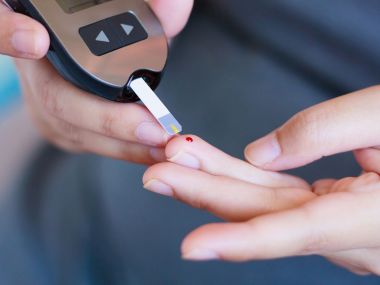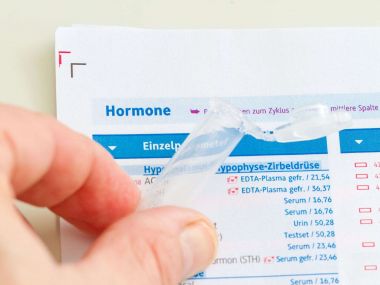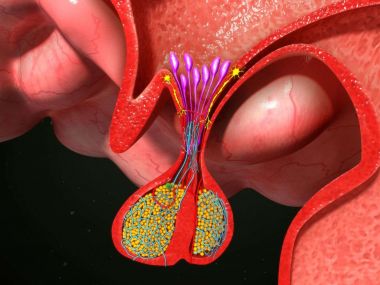Article overview
Endocrinology and diabetology - Further information
Main treatment emphases in endocrinology
Endocrinology addresses hormone balance and its potential disorders affecting growth, reproduction, development and responses to pressures and stress. An endocrinologist deals with diseases which affect the hormone-producing organs such as the
- thyroid gland and parathyroid gland
- pancreas
- pituitary gland (hypophysis)
- adrenal glands
- sexual organs
The following are among the commonest disease profiles requiring treatment:
- obesity
- diabetes mellitus
- fat metabolism disorders
- functional disorders of the sex glands
- pituitary gland diseases (e.g. adenoma)
- thyroid gland diseases (e.g. overactivity or underactivity, Cushing's syndrome, Addison's disease)
Diagnostic and treatment procedures in endocrinology
Both physical and laboratory examinations are carried out for a precise diagnosis of hormonal diseases.
Depending on what the doctor suspects, the following diagnostic techniques may be applied:
- ultrasound examination of the abdominal organs and/or thyroid gland
- X-ray of the skeletal system and the chest organs
- CT or MRT to examine the structure of the organs
- echocardiogram of the heart
- measurement of bone density using DEXA (examination of the hip and lumbar column)
- Doppler sonography of the vascular system of the brain and extremities
- special examinations of hormone metabolism in the laboratory
In most cases, irregularities in the hormone balance can be equalized by giving a specific dose of a hormone or medication. It is often necessary to graduate the dose step by step until the right dose is reached. This requires the treating doctor to exercise strict control over the dosage.
Frequently there needs to be a change of diet and general lifestyle (e.g. for a malfunctioning thyroid gland or diabetes). In these cases, it is important that the patient receives thorough counseling.
Depending on the hormonal disorder, sometimes lifelong treatment is essential (e.g. for thyroid gland disorders). Also, some regular sporting activity can have a positive impact on the therapy.
It is often enough just to take hormone preparations and with organic causes surgical action is also taken. If mental problems have brought on the hormone disorders, psychological or psychiatric treatment may be helpful.
During the whole treatment period, regular checks (e.g. blood count) are carried out by the doctor.
Main treatment emphases in diabetology
Diabetology addresses the prevention, diagnosis and treatment of diabetes mellitus and also research into it. The key basic types covered by this sub-field are diabetes mellitus type 1 and diabetes mellitus type 2. Additionally, diabetes during pregnancy is treated.
In addition, the diabetologist deals with the following secondary diseases:
- diabetic foot syndrome
- diabetic nephropathy
- hyperglycemic or hypoglycemic shock
- diabetic polyneuropathy
If diabetes brings on eye diseases, these must be further treated by an ophthalmology specialist.
Diagnostic and treatment procedures in diabetology
If diabetes is suspected, the first diagnostic step is to take multiple measurements of blood sugar levels on an empty stomach. Performance of an oral glucose tolerance test (oGTT) can also provide evidence. The latter is used especially during pregnancy care in order to rule out pregnancy-induced diabetes or to treat it appropriately if there are signs of it.
If the diagnosis of 'diabetes' has been made, the following treatment options can be considered:
- training (e.g. on the right diet, on self-measurement, on the use of medication)
- advice on the use of an insulin pump
During the whole treatment period, regular checks of blood sugar levels and of long-term blood sugar (HbA1c reading) are carried out.
Connection between endocrinology and diabetology
Diabetology is regarded as a sub-field of endocrinology, which generally addresses hormone disorders. Insulin is naturally a hormone and is therefore also a concern of endocrinology.
Because diabetes mellitus has now become a common and widespread disease, it is no longer only endocrinologists who address this disease profile. General medical practitioners are now also specializing in this sub-field of internal medicine.
Further training in the field of endocrinology and diabetology
Doctors who are already practicing can take further training in the field of 'Internal Medicine and Endocrinology and Diabetology' to gain this specialist qualification. For this, they must cover the following further training periods and content (including further basic training):
- 36 months of ward-based basic further training in the field of internal medicine
- 36 months of further training in endocrinology and diabetology (six months of that in internal intensive medicine - also possible during basic further training)
Up to 18 months of further training can also be completed in the out-patient field. The total period of 72 months must be completed with a person authorized to provide further training and at a further training location within the meaning of § 5 paragraph 1 sentence 1.
On obtaining two specialist qualifications in the field of internal medicine, the whole period of further training is at least eight years.
Knowledge dispensed during the period of further training:
- content of the basic further training
- prevention, recognition and treatment from endocrine diseases to hormone-producing glands
- additional further training on the endocrine pancreas and diabetes mellitus
- prevention, recognition and treatment from metabolic diseases (including metabolic syndrome)
- knowledge of all hormone-producing glands, glands with orthotopic or heterotopic locations, paraneoplastic hormone-production locations or also tumors)
- knowledge of diseases with a connection with diabetes (i.e. arterial high blood pressure, lipid metabolic disorders, coronary heart disease)
- treatment of secondary diabetes forms and pregnancy-induced diabetes
- prevention, early detection and treatment of complications of diabetes mellitus
- knowledge of insulin pumps and treatment with insulin
- knowledge in the field of dietary counseling and dietetics with endocrine diseases and metabolic diseases
- identification of a medical indication and methodology, implementation and also classification of all laboratory examinations (e.g. of parameters of the hormones or with diabetes)
- recognition and therapy of andrological (male health) clinical profiles
- knowledge needed for conducting structured training courses for diabetics (types 1 and 2) and pregnancy-induced diabetes and training to enable detection of hypoglycemia
- knowledge for counseling families or for choosing suitable work/careers in the face of endocrine diseases
- identification of medical necessity and evaluation of nuclear-medicine in-vivo examinations of the endocrine organs
- intensive medicine basic care
- identification of a medical indication of surgical, radiotherapeutic or also nuclear-medicine treatments
Also, the corresponding diagnostic and treatment techniques are taught as part of the further training. Naturally, the specialist training can follow on directly after the successfully completed course of medical studies.






